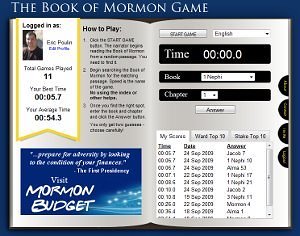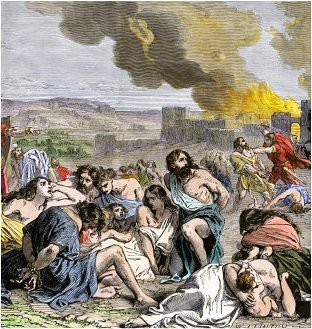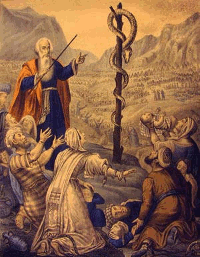
The Book of Mormon Game interface
Today I launched the Book of Mormon Game (http://bookofmormongame.com), a new, completely free, online audio scripture chase game.
It’s a fun and competitive game which reads the Book of Mormon to you from a random place and you have to find where its reading from and race against a timer. Your scores will show along with ward/stake members. This game can help you become more familiar with the Book of Mormon and is a fun way to get in your daily scripture “reading”.

"...he has spoken unto you like unto the voice of thunder..."
“Ye are swift to do iniquity but slow to remember the Lord your God. Ye have seen an angel, and he spake unto you; yea, ye have heard his voice from time to time; and he hath spoken unto you in a still small voice, but ye were past feeling, that ye could not feel his words; wherefore, he has spoken unto you like unto the voice of thunder, which did cause the earth to shake as if it were to divide asunder.
And ye also know that by the power of his almighty word he can cause the earth that it shall pass away; yea, and ye know that by his word he can cause the rough places to be made smooth, and smooth places shall be broken up. O, then, why is it, that ye can be so hard in your hearts?”
Nephi is speaking to his brothers. He and his brothers are Jews, part of the chosen people. We should liken this to the Prophet of our day speaking to us, members of the church. Probably we have not seen an angel, but today, more than ever, we do hear the voice of God and His servants often, through conferences, magazines, scriptures, internet and at church. But, have we become desensitized?
Its interesting to note that thunder is caused by a bolt of lightning. The heat from the lightning forces the air away from the source, then when it is gone, those masses of air rush back together and we hear the CLAP of lightning as these air masses crash into each other from all directions. When the Lord shares His light with us, by speaking to us, hopefully we see the light. But if we don’t notice (are past feeling), the thunder will surely get our attention.
Having the wrong balance when it comes to money is always a curse to our spirituality. If we perceive ourselves as having too little money, this can become an obsession. We look at everything as an opportunity for income, not necessarily for intrinsic value. Service can diminish into jobs, and the constant “worry state” can cause us to ignore or not be able to feel the promptings of the Spirit. If we have a lot of wealth and perceive ourselves as totally self-sufficient, we no longer see a need for God to care for us, since we seem to be doing such a good job “on our own”. If a sentiment like this overtakes us, pursuit of Spiritual things will end, we will not be motivated to serve God and again, the Spirit will not reach our ears as readily.
In both of these scenarios, it is not the amount of money that affects us, but how we perceive our situation about money. If we have a proper balance in our minds, it will change our entire outlook and actions, and can allow us to be receptive to the promptings of the Spirit. If we are “past feeling”, the Lord sometimes will speak to us “like unto the voice of thunder” so He can get through to us. But, if we don’t change our ways one of two things may happen.
- Like a person who requires strong medication, the body adapts to the medication, and stronger and stronger doses are needed to do the same job. If we ignore or don’t change our thinking and actions, the Lord may speak “like unto the voice of thunder”, then move to earthquakes, and then worse to get our attention. Consider the amount of natural disasters that have been increasing in magnitude and frequency around us. Surely we, as a society, have need to be humbled.
- He may stop speaking to us altogether. If we are so past feeling, sometimes, by our agency, we no longer want to hear the Lord or His Spirit and He will simply give us that wish. This is truly a tough place because then typically the Lord speaks to others on our behalf to try and help… to get us back. Faithful home teachers, friends, Bishops often fall into this category.
Application of these ideas is not solely fitted to money of course, but I think you can see how it clearly does apply to how we think about money. Let us keep our hearts and minds soft so we do not require the Lord to take drastic measures to communicate with us. Whether rich or poor, keep a balance regarding how you think about money, and in the long term, the Lord will bless you with what you need.
“Wherefore, the Lord commanded my father that he should depart into the wilderness; and the Jews also sought to take away his life; yea, and ye also have sought to take away his life; wherefore, ye are murderers in your hearts and ye are like unto them.”
Quick recap:
- The people in Jerusalem had become wicked and were about to be destroyed because the Lord would not protect them.
- Laman and Lemuel are like the people in Jerusalem.

Sometimes the bad comes with the good.
But… Laman and Lemuel were not destroyed. Instead, they were given the opportunity to go along with the righteous (kicking and screaming) to the promised land. Sure, they had moments of repentance, but, in the end, always showed their true colors of jealousy, pride and selfishness. They didn’t merit their opportunity. They merited destruction like the rest in Jerusalem. However, because they were related to some righteous people, they were granted something they didn’t deserve. Even if their hearts were in the right place at the beginning, they quickly became “murders in their hearts”, but still managed to ride the coat-tails of the righteous part of Lehi’s family.
How often have you seen this? A righteous wife who is struggling to do her best with a lazy, disobedient or half-hearted husband who just slides by. A husband who is trying to balance his job, calling and role as parent, trying to honor his priesthood, but his wife just doesn’t try to do her part, doesn’t support him, and complains about the time he takes to serve others. A family who has a rebellious son or daughter who pulls the whole family unit down or makes it very difficult to do what’s right. I’m sure you can name examples like this fitting each of these and more scenarios.
The same happens in money related scenarios. Some employees are hard-working and others just do the bare minimum, and do a poor job at it. Sometimes in a marriage, one spouse is trying to balance the budget while the other spends uncontrollably with reckless regard to the family finances.
Why are the less righteous or wicked permitted to do this? Well, father Lehi teaches us that there is “opposition in all things“, which makes part of our testing ground here in mortality. The Book of Mormon also teaches us that the Lord permits the righteous to go through strife, adversity and even death at the hands of the wicked, in order that the wicked may be justly judged. This of course requires an eternal perspective to understand and appreciate.
We know the Lord wishes us to be prosperous as we obey His will. Sometimes our righteous agency will bring the disobedient to prosperity. Sometimes the unrighteous agency of people will bring us to poverty. But, in the grand scheme of things, on a societal basis and not necessarily on an individual basis, the Lord prospers the righteous. Financial safety comes with obedience to the gospel, along with all other attendant (and more important) blessings. Don’t worry about the justice of the disobedient who seems to prosper. They will have their reward. Rather, focus on your obedience, service and love for the Lord and His children, and you will find all your needs met and prosperity more likely to greet you.

Jerusalem Falls
“And now, after all these things, the time has come that they have become wicked, yea, nearly unto ripeness; and I know not but they are at this day about to be destroyed; for I know that the day must surely come that they must be destroyed, save a few only, who shall be led away into captivity.”
Nephi, writing this at about 591BC, is very close regarding the Babylonian Captivity, which occurred at 586BC – just 5 years later (remember time counts towards 0 on the BC scale). As we can recall, this captivity was the reason Lehi and his family left Jerusalem. Lehi tells us this destruction and captivity was due to the wickedness of the people. Nephi reminds us about this prophecy here. There are some interesting reasons we can review (after the fact) about why the Lord spared Lehi and his family from the captivity and brought them to the promised land in the Americas.
- The captivity lasted quite a while (until 537BC – a total of 49 years). It wasn’t until Persia overthrew Babylonia that the Jews were given permission to return to Jerusalem. Over this period of time, many of the Jews intermingled with the locals; traditions changed, even the religion changed somewhat. When they returned to Jerusalem almost 50 years later, 2 generations had passed and they had a really hard time restoring things back to the way they were. In fact, things were never quite the same, as much of the traditions evolved while in Babylonian captivity. Lehi’s family were removed from this situation and continued their religious worship unblemished by the captivity.
- When the captivity happened, many were killed and the rest were taken to Babylon. The Jews did not bring their homes and riches with them. They were captive, not treated quite as a traditional slaves, but they certainly had their wealth taken from them with no promise of that status changing any time soon. Lehi’s family, on the other hand, left their wealth voluntarily, being led towards a promised land. They were not captives; they were free. While there is no doubt they toiled on their journeyings they were never slaves and they all had hope that the promised land was coming.
Lehi’s family, by heeding the commandments of the Lord were spared the great toils of captivity. Even Laman and Lemuel, who pushed back so many times, were spared captivity. We too can be spared many pitfalls in life by heeding the commandments. Many of the things we’ll be spared will be spiritual challenges, but also many things we can be spared from are physical things, enabling us to obtain our promised land in due time.
“And he did straiten them in the wilderness with his rod; for they hardened their hearts, even as ye have; and the Lord straitened them because of their iniquity. He sent fiery flying serpents among them; and after they were bitten he prepared a way that they might be healed; and the labor which they had to perform was to look; and because of the simpleness of the way, or the easiness of it, there were many who perished.
And they did harden their hearts from time to time, and they did revile against Moses, and also against God; nevertheless, ye know that they were led forth by his matchless power into the land of promise.”
An interesting cross reference here – rods are often used as a metaphor for God’s word. Think of Lehi’s dream – the iron rod is the word of God; also Isaiah 11:4 (smite the earth with the rod of His mouth). Here we see that the Lord straitened them with his “rod”, which is His word, usually through His prophet.
Now, Nephi is using his words to convince his brethren that he is not foolish in trying to build a ship. He is using examples from the past to bring the their remembrance that God, at times, commands that great things be done, and His servants can accomplish them. Other times the commandments are simple, yet the people still do not follow.
You remember that the Israelites created a golden calf to worship as Moses was receiving the 10 commandments at Sinai. While this was obvious idolatry, part of what they were worshiping in the gold calf was the gold – the symbolism of wealth. After generations of slavery, who wouldn’t want some wealth. But of course, when wealth becomes the center of our worship, the intent of our hearts, only problems live there. God requires our devotion and asks that we have an eye single to His glory – only then can we secure the blessings that he has in store for us – including blessings of prosperity.
Another interesting lesson here is Moses brazen serpent. Another quick refresher – the Israelite (again) began worshiping other gods and were not keeping the law, so the Lord sent fiery flying serpents (and scorpions according to Deut 8:15). Moses created a brass serpent and put it on a staff and in order to be saved from the bites and the Israelites were told that to be healed they just had to look at the brazen serpent. The scriptures tell us that many of them perished because the labor (to look at the serpent) was too easy. We can imagine how it would have been: You are in your tent having been bitten by one of these poisonous snakes; you are sick and nauseous and dieing. Someone runs to the door of your tent and says: “Moses has just told us, if we look at this brass snake he created and put on a staff – we’ll be healed”. Then he runs off to tell the next tent. There are millions of us in the camp, so we’d have to travel to the brazen serpent feeling sick and all. Would you have the faith to make the trek in that condition to just look at the serpent? Or would you be calling for the doctor?
The serpent, of course, was a symbol of Christ. As we look to Him and keep an eye single to His glory, our souls will be healed, and through His atonement our fallen state will be excused and we can be permitted to return to Heaven.
From a wealth point of view we can learn from both of these historical stories. We can’t pursue wealth for the sake of pursuing wealth and expect the Lord to help us. When we put the pursuit of wealth before God, we are idolators also. If we are obedient and follow the commands the Lord gives, even those from our local leaders, we can be taken from our impoverished state to a state of enrichment with all of the accompanying blessings the Lord promises us. Lets be careful we don’t fall into the trap of expecting to have to perform “some great thing” to qualify for the Lord’s blessings. Lets take Him at His word and expect the blessings that come with obedience.

Debt is slavery
“And he loveth those who will have him to be their God. Behold, he loved our fathers, and he covenanted with them, yea, even Abraham, Isaac, and Jacob; and he remembered the covenants which he had made; wherefore, he did bring them out of the land of Egypt.”
Some historical refresher… Before the Exodus, the Israelites had been in Egypt for 400 years after Joseph had Jacob’s family move in. At some point during that time, the Israelites became slaves to the Egyptians. Many believe the Israelite “slavery” was not nearly as bad as is commonly depicted in major motion pictures. How did they turn into slaves? Among the reasons, debt is high in the list.Interestingly, modern-day prophets refer to debt as slavery – even the Lord refers to this as he instructs Martin Harris to “Pay thy debt… Release thself from bondage” D&C 19:35.
The evocation of the Moses story was a powerful lesson to Nephi’s family – to any family, even in our day. We will do well to remember that the Lord will deliver us from bondage and slavery as we are consistently loyal and obedient to him. We need to be careful about our debts, yes; but sometimes we fall into financial bondage without much choice in the matter. We can be delivered from our debts, but in the Lord’s time. The scripture says the Lord “remembered the convenants” he made. Clearly he didn’t forget, but they were fulfilled unto the Israelites after many years of slavery and unanswered prayers. We too many need to spend time, even years at a time in our personal bondages, even in debt, before we too are delivered. Our delivery will likely be less miraculous than a deliverer bringing us on an Exodus from our debtors. Rather, small graces must be taken advantage of. Rather than spending unexpected income on frivilous items, pay down your debts. Over time, the Lords tender mercies will add up to our deliverance.
“And behold, there was peace in all the land, insomuch that the Nephites did go into whatsoever part of the land they would, whether among the Nephites or the Lamanites.
And it came to pass that the Lamanites did also go whithersoever they would, whether it were among the Lamanites or among the Nephites; and thus they did have free intercourse one with another, to buy and to sell, and to get gain, according to their desire.
And it came to pass that they became exceedingly rich, both the Lamanites and the Nephites; and they did have an exceeding plenty of gold, and of silver, and of all manner of precious metals, both in the land south and in the land north.”
“And behold, there was all manner of gold in both these lands, and of silver, and of precious ore of every kind; and there were also curious workmen, who did work all kinds of ore and did refine it; and thus they did become rich.
They did raise grain in abundance, both in the north and in the south; and they did flourish exceedingly, both in the north and in the south. And they did multiply and wax exceedingly strong in the land. And they did raise many flocks and herds, yea, many fatlings.
Behold their women did toil and spin, and did make all manner of cloth, of fine-twined linen and cloth of every kind, to clothe their nakedness. And thus the sixty and fourth year did pass away in peace.
And in the sixty and fifth year they did also have great joy and peace, yea, much preaching and many prophecies concerning that which was to come. And thus passed away the sixty and fifth year.”
Free trade makes for a wealthy society. Common belief in society fosters commerce and makes society as a whole wealthy. Part of this has to do with specialization in industry. Specialization makes for higher quality products and services, and so long as everyone is contributing effort and work, that society will fluorish.
This points to another theme covered in previous posts about the value of networking. It was only by intermingling with other poeple that the society as a whole became “exceedingly rich”. As we individually intermingle with others and enlarge our network of contacts, friends, associates we a also more likely to “fluorish exceedingly”.
There are networking organizations whose sole purpose is to bring together people who have a common interest of passing leads to each other (I’m thinking of BNI). Personally, I know of the power of networking. Opportunities arise as you put yourself out there for people to know who you are and what you do. I’ve found a particularly helpful tool is connecting with people who are “hubs”. You know people like this… people who seem to know everyone or can easily become friends with everyone in a room. As you connect closely with people like this, they can help introduce you and your ideas around and help make opportunities.

Toronto Temple Coin
Thanks to my good friend Gavin who pointed this one out to me.
Highlights from Haggai 1:5-9. (Old Testament, p.1166 in the LDS Edition of the Old Testament)
” …Consider you ways.
Ye have sown much, and bring in little; ye eat, but ye have not enough; ye drink, but ye are not filled with drink; ye clothe you, but there is none warm; and he that earneth wages earneth wages to put it into a bag with holes.
This saith the Lord of hosts; Consider your ways.
Go up to the mountain, and bring wood, and build the house; and I will take pleasure in it, and I will be glorified, saith the Lord.
Ye looked for much, and, lo, it came to little; and when ye brought it home, I did low upon it. Why? saith the Lord of hosts. Because of mine house that is waste, and ye run every man unto his own house.”
This scripture was written shortly after (17-18 years) the Jews return to Jerusalem from the captivity in Babylon.
We know that the common reference to the “mountain of the Lord” means the temple. The Lord was saying through Haggai that although effort was put in to earn wealth and provide for oneself and family, the return just wasn’t quite enough. Where were the blessings of heaven? Why did they struggle? It is revealed here that the temple had to be rebuilt and used.
Most reading this are in relatively close proximity to a temple. Are we using it the way we should? Would Haggai’s words apply to us? Make sure your temple attendence (and worthiness) is not lacking so the Lord doesn’t withhold monetary success from you because of your poor temple attendence. Temple worship is a great, peaceful experience; a way to serve others and the Lord’s purposes. And — as noted here, it can help make sure your are getting enough and more.
1 Nephi 17 33-38
“And now, do ye suppose that the children of this land, who were in the land of promise, who were driven out by our fathers, do ye suppose that they were righteous Behold, I say unto you, Nay.
Do ye suppose that our fathers would have been more choice than they if they had been righteous I say unto you, Nay.
Behold, the Lord esteemeth all flesh in one; he that is righteous is favored of God. But behold, this people had rejected every word of God, and they were ripe in iniquity; and the fullness of the wrath of God was upon them; and the Lord did curse the land against them, and bless it unto our fathers; yea, he did curse it against them unto their destruction, and he did bless it unto our fathers unto their obtaining power over it.
Behold, the Lord hath created the earth that it should be inhabited; and he hath created his children that they should possess it.
And he raiseth up a righteous nation, and destroyeth the nations of the wicked.
And he leadeth away the righteous into precious lands, and the wicked he destroyeth, and curseth the land unto them for their sakes.”
Lest we, as a people, become prideful we need to be reminded that were are not chosen because of bloodline, membership in an organization or any other similar reason. We are chosen only because of our righteousness. The blessings of the Lord are available to all. We cannot expect to join the Lord’s church and then coast through life with His blessing. We need to be righteous, always trying to improve, overcoming our weaknesses. The Lord will bless us for our righteousness only. We’ll receive our “precious land” because of our obedience. Otherwise we face the curse of the land, for our own sakes.
That also means our business competitors can be equally blessed according to their righteousness. There’s lots of good people out there to compete with, so make sure you’re obedience, or lack thereof, is not holding you back from success. Afterall, if your competitors are righteous, they are also chosen and able to receive the Lord’s blessings.
1 Nephi 17:20-22
“And thou art like unto our father, led away by the foolish imaginations of his heart…
And we know that the people who were in the land of Jerusalem were a righteous people; for they kept the statutes and judgments of the Lord, and all his commandments, according to the law of Moses…And after this manner of language did my brethren murmur and complain against us.”
Nephi’s brethren are now fathers, so they take this opportunity to complain about the hardships of their wives and how they could have been enjoying their possessions back in Jerusalem. There is no particular mention of Laman and Lemuel in this passage, which makes me think that even young Sam has joined in the complaining, leaving Nephi truly alone.
However, lets look at some of the problems with the complaints of Nephi’s brethren.

Distorted View of Reality
- They are delusional. They claim that the people in Jerusalem were righteous, even though when they left, Jeremiah had been thrown in to prison and Lehi’s life was threatened for preaching repentance to the people. While they were still likely performing all of the rituals associated with the Mosaic Law, they were far from righteous. Righteousness is not defined by rote obedience to a strict ritualistic law, but by the intentions of the heart. Surely Jeremiah and Lehi were prophesying about similar things, turn your heart to Jehovah to avoid certain destruction. Eight years in the wilderness has a way of distorting perspective and truth, especially when coupled with a longing for relaxing and riotous living.
- Despite seeing an angel and having their plight confirmed, they call Lehi’s visions and commandments “foolish imaginations of his heart”. They have seen several demonstrations now of the power of God, yet still they choose to turn a blind eye towards the truth.
- The use the word “wander” in the wilderness, when they have been guided and directed by the Liahona.
- They tie happiness with enjoying their possessions in Jerusalem. We all know money cannot buy happiness, so clearly this is delusional also. There are always problems to be found in any situation. Its how we handle life’s irritants that defines and determines our “happiness”.
Now, their complaints did have some truth mixed in with them for good measure, in order to strengthen their arguments and make their statements seem more persuasive. However, it is not difficult for anyone who recognizes truth to see through these weak arguments and complaints and refute them.
[Right… noted. But whats this got to do with money and budgeting?]
We often get into trouble when we make financial decisions that are not based on correct perceptions of reality. A few examples: Read the rest of this entry »

